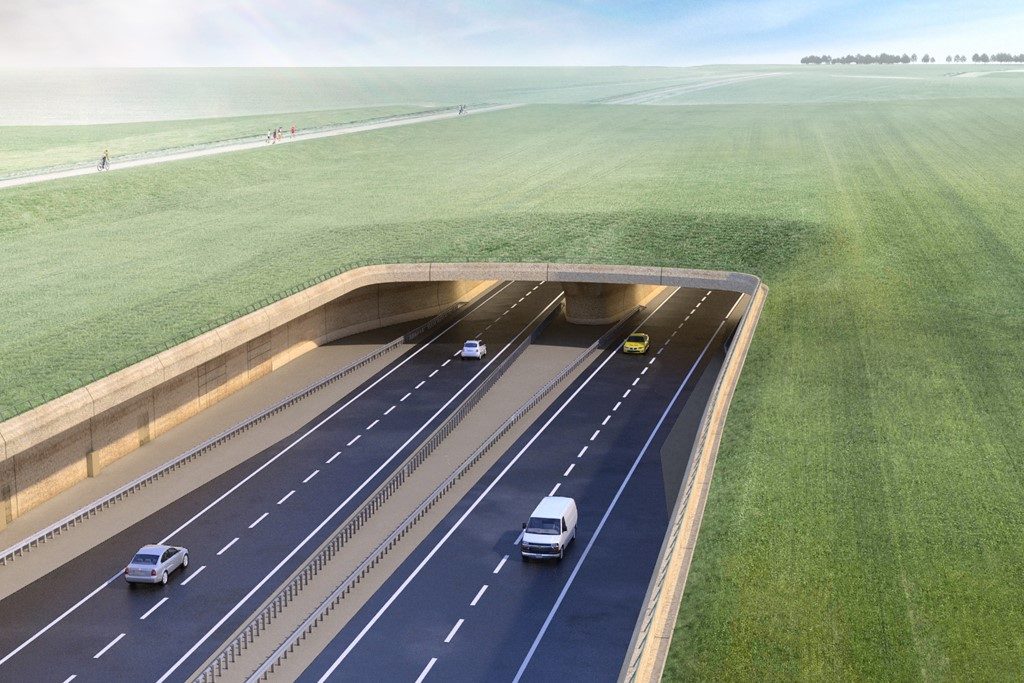Chancellor Rachel Reeves has shelved two “unaffordable” road projects, and confirmed reviews into government transport and healthcare building projects.
Reeves announced yesterday (29 July) that the planned A303 Stonehenge tunnel scheme (CGI pictured) and the A27 Arundel bypass would not go ahead. In addition, an £85m regional railway-improvement programme faces the axe.
The Treasury claims these measures will save £785m in the 2025-26 financial year.
Reeves said an audit carried out by her department had revealed £1bn of unfunded transport commitments for 2025, which transport secretary Louise Haigh would review.
“As part of that work, she has agreed not to move forward with projects that the previous government refused to publicly cancel despite knowing full well that they were unaffordable,” the chancellor said.
Marie-Claude Hemming, director of operations at the Civil Engineering Contractors Association (CECA), called the announcement “disappointing”, but said her organisation would work with the government to identify how stalled schemes might be swiftly revived.
She added: “It is frustrating that firms are expected to bear the costs of delay without regard to their forward planning in terms of workload and skills.
“Our industry thrives on certainty of investment, which is what enables CECA members to plan and deliver world-class infrastructure, upskill the workforce to meet projected need, and ensure sustainable and stable business models.”
Construction News approached the Department for Transport for further information.
Reeves also confirmed the government is reviewing the £20bn New Hospital Programme, a move that health secretary Wes Streeting announced last week.
She said the previous government was not “anywhere close to the funding required to deliver” the 40 hospitals promised by 2030. Reeves added that since former prime minister Boris Johnson announced the policy in October 2020, only one new facility has opened to patients and only six projects have started main construction activity.
She said: “We need to be straight with the British people about what is deliverable and what is affordable.”
Saffron Cordery, deputy chief executive of NHS Providers, which represents NHS trusts in England, urged the government to keep its manifesto pledge to deliver the hospital building programme and complete the review quickly “so that trusts get the clarity and certainty they desperately need”.
She added: “Too many NHS buildings and facilities are falling to bits. Soaring costs, on-hold building projects and the growing bill for patching up crumbling sites and facilities has seen some trusts with already-stretched budgets having to spend more than £1 million a month, while delays put long-anticipated new buildings further beyond reach.”
Among the hospitals in the programme are Bouygues’ £300m Oriel eye hospital and Laing O’Rourke’s £300m Cambridge Cancer Research Hospital.
Bam Nuttall was appointed in 2021 to a £320m main works contract on the A27 Arundel bypass in Sussex, although CN understands it is no longer contracted on the project.
A European consortium had been signed up to replace a single carriageway on the A303 in Wiltshire with a dual carriageway, including a two-mile tunnel beneath Stonehenge.
Historian Tom Holland welcomed the delay, saying: “This monstrous white elephant should have been put out of its misery long ago.
“Until the government officially terminates the project, it will continue to leech taxpayers’ money. A delay is not good enough. Cancel it now!”
Institution of Civil Engineers interim associate policy director David Hawkes welcomed another announcement that government spending will be reviewed every two years.
He added: “Whatever the level of investment and priorities that the government decides on, infrastructure professionals, stakeholders and the public need clarity and commitment to deliver.
“Now, it’s essential that the government make decisions about the infrastructure that should be invested in, in line with the priorities outlined by [government advisory body] the National Infrastructure Commission in its second National Infrastructure Assessment.”
Shadow chancellor Jeremy Hunt rejected Reeves’ claims about the state of the economy, saying “she wants to blame the last government for […] project cancellations she planned all along”.
Reeves said she would take more “difficult decisions to meet our fiscal rules” in the Budget on 30 October.

